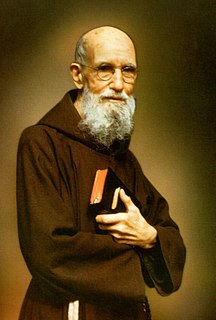A Quote by Henri Poincare
Tolstoi explains somewhere in his writings why, in his opinion, “Science for Science's sake” is an absurd conception. We cannot know all the facts, since they are practically infinite in number. We must make a selection. Is it not better to be guided by utility, by our practical, and more especially our moral, necessities?
Related Quotes
It must be for truth's sake, and not for the sake of its usefulness to humanity, that the scientific man studies Nature. The application of science to the useful arts requires other abilities, other qualities, other tools than his; and therefore I say that the man of science who follows his studies into their practical application is false to his calling. The practical man stands ever ready to take up the work where the scientific man leaves it, and adapt it to the material wants and uses of daily life.
Many people correctly make the point that our only hope is to turn to God. For example, Charles Lindbergh, who said that in his young manhood he thought "science was more important than either man or God," and that "without a highly developed science modern man lacks the power to survive," . . . went to Germany after the war to see what Allied bombing had done to the Germans, who had been leaders in science. There, he says, "I learned that if his civilization is to continue, modern man must direct the material power of his science by the spiritual truths of his God."
The scientific value of truth is not, however, ultimate or absolute. It rests partly on practical, partly on aesthetic interests. As our ideas are gradually brought into conformity with the facts by the painful process of selection,-for intuition runs equally into truth and into error, and can settle nothing if not controlled by experience,-we gain vastly in our command over our environment. This is the fundamental value of natural science
Science is being daily more and more personified and anthromorphized into a god. By and by they will say that science took our nature upon him, and sent down his only begotten son, Charles Darwin, or Huxley, into the world so that those who believe in him, &c.; and they will burn people for saying that science, after all, is only an expression for our ignorance of our own ignorance.
To be a science fiction writer you must be interested in the future and you must feel that the future will be different and hopefully better than the present. Although I know that most - that many science fiction writings have been anti-utopias. And the reason for that is that it's much easier and more exciting to write about a really nasty future than a - placid, peaceful one.
It is clear that everybody interested in science must be interested in world 3 objects. A physical scientist, to start with, may be interested mainly in world 1 objects--say crystals and X-rays. But very soon he must realize how much depends on our interpretation of the facts, that is, on our theories, and so on world 3 objects. Similarly, a historian of science, or a philosopher interested in science must be largely a student of world 3 objects.
It is a curious thing: man, the centre and creator of all science, is the only object which our science has not yet succeeded in including in a homogeneous representation of the universe. We know the history of his bones, but no ordered place has yet been found in nature for his reflective intelligence.
Science has a simple faith, which transcends utility. Nearly all men of science, all men of learning for that matter, and men of simple ways too, have it in some form and in some degree. It is the faith that it is the privilege of man to learn to understand, and that this is his mission. If we abandon that mission under stress we shall abandon it forever, for stress will not cease. Knowledge for the sake of understanding, not merely to prevail, that is the essence of our being. None can define its limits, or set its ultimate boundaries.
Every child must be encouraged to get as much education as he has the ability to take. We want this not only for his sake - but for the future of our nation's sake. Nothing matters more to the future of our country: not our military preparedness - for armed might is worthless if we lack the brainpower to build world peace; not our productive economy - for we cannot sustain growth without trained manpower; not our democratic system of government - for freedom is fragile if citizens are ignorant.








































